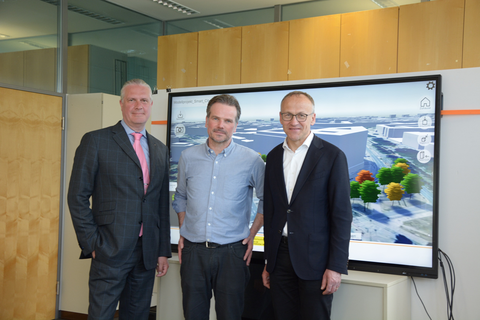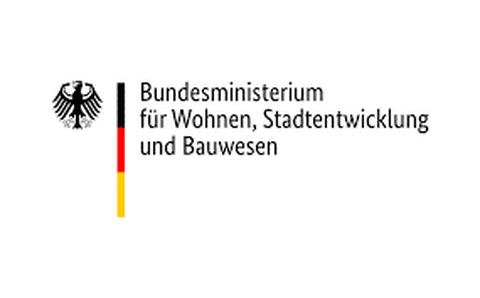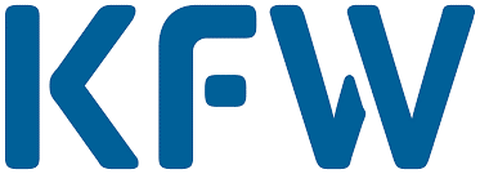May 19, 2022
19 million euros for a "smarter" city. TU Dresden and the City of Dresden take part in the Smart City model project

Prof. Breidung, Prof. Noennig, Dr. Lames (left to right)
How can people in Dresden address their concerns and wishes to the city administration quickly and easily? And how will the administration itself be set up in future to deal with them in a targeted and efficient manner? To answer these questions, the city of Dresden and the Technische Universität Dresden are investing around 19 million euros and developing a joint smart city concept. They are thus among the 28 model projects selected by the Federal Ministry of Housing, Urban Development and Building (BMWSB). Under the guiding theme "Together out of the Crisis: Space for the Future", the ministry called on cities, districts and municipalities last year to strategically address digitalisation as a "Smart Cities Model Project".
"Most of us are already on the move in the digital world every day. Numerous services and processes in the city can already be handled digitally today. With the federal funding, we can now take a giant step towards an even 'smarter' city. I am particularly pleased that we are realising digitisation as a partner between the administration and TU Dresden and thus bundling our competences. The fact that we are one of the 94 applicants selected clearly underlines this," says Mayor Dirk Hilbert.
The project volume for the Dresden Smart City concept amounts to 19 million euros, 65 percent of which is funded by the BMWSB. The city of Dresden is participating in the project with 35 percent. In managing the project, the state capital of Dresden relies on the expertise of its own IT services company and envisages close cooperation with the TU Dresden as the main scientific partner. The WISSENSARCHITEKTUR Laboratory of Knowledge Architecture (TUD) will play a key role in supporting and shaping the creation of the smart city strategy in the first phase of the project.
Digital applications and concepts should further strengthen Dresden
The Smart City model project focuses on citizens. Digital participation tools for "Dresden's Smart Citizenship" are to enable Dresdeners to communicate directly with the city administration on all matters of urban development. The WISSENSARCHITEKTUR Laboratory of Knowledge Architecture and the city planning office have already gained initial experience with the U_CODE participation process, which involves various interest groups in the design of urban spaces and buildings. Using digital tools, citizens can contribute their ideas and suggestions, which are then processed and evaluated as automatically as possible. The aim is to create intelligent neighbourhoods with a higher quality of life, participation and sustainability. The smart applications and concepts developed during the project, which will run until the end of 2026, should make a decisive contribution to strengthening Dresden as a liveable city and can be applied by other cities throughout Germany.
“The contribution to the grant project,” says Dr. Peter Lames, Mayor of Finances and CIO, “attests to the excellent results of digitalization in Dresden that have placed us 6th in the in the 2021 country-wide Smart City Index of Bitkom, a leading association in the IT sector. This project will enable us to achieve the goals we set with the new administration building in a much more sustainable way.” The new administrative centre in Dresden's city centre, which is to be built by 2025, in conjunction with the digitally networked neighbourhoods, will thus become the prototype of a digital city hall that centrally brings together all processes, integrates stakeholders and enables networked development in the individual districts as well as the city as a whole.
TU Dresden as co-initiator and main partner of the model project
The TU Dresden is the first address in Dresden to be chosen as a scientific partner for the Smart Cities model project, because the WISSENSARCHITEKTUR Laboratory of Knowledge Architecture in the Department of Building and Environment (Faculty of Architecture) has already investigated digital solutions for living and working in the digitally networked city of tomorrow in various research projects. Prof. Jörg Rainer Noennig, head of the working group and co-initiator of the application, explains: "We have been interested in the development of smart cities and intelligently networked spaces for almost a decade. With initiatives such as our ESF innovation team 'Data4City' or the joint project 'Shaping the Digital City', we have investigated future-oriented technologies and developed new methods with which the potential of the digital transformation can be used for the development of socially and ecologically sustainable urban communities. The Smart Cities model project now offers Dresden and its research landscape a unique opportunity to explore and purposefully implement such approaches with stakeholders from the city administration, civil society, politics and business".
Background:
In response to the BMWSB's call for proposals, 94 cities, districts and municipalities as well as inter-municipal cooperations from all over Germany submitted applications under the guiding theme "Together out of the crisis: Space for the future". In addition to the Dresden application, 27 other submissions were selected, for which a total of 300 million euros is available. With the economic stimulus and future package in June 2020, the Federal Government decided to continue funding the Smart Cities model projects and to increase them to a total of 820 million euros.
With the Smart Cities model projects, the Federal Government supports municipalities in strategically shaping digitalisation in the sense of integrated, sustainable and public welfare-oriented urban development. The model projects develop and test cross-sector digital strategies for the city life of the future.
Media inquiries:
TU Dresden
WISSENSARCHITEKTUR Laboratory of Knowledge Architecture
Prof. Jörg Rainer Noennig
Tel.: +49 351 463-32210
Landeshauptstadt Dresden
Eigenbetrieb IT Dienstleistungen
Prof. Michael Breidung
Tel.: +49 351 4884500
Funded by:


